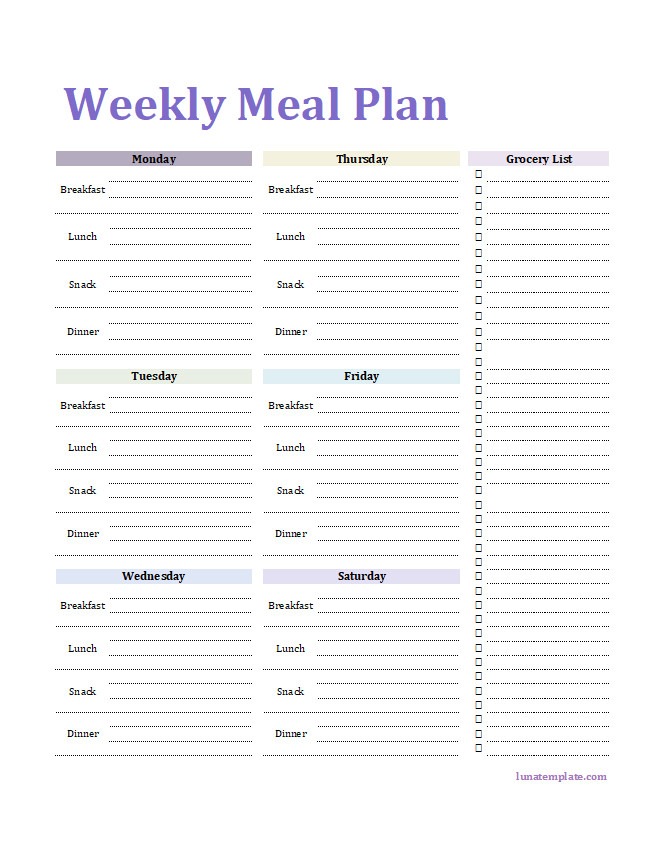Are you tired of wondering what to cook for dinner every night? Do you find yourself wasting food because you didn’t have a plan? Are you looking for a way to stay on budget when grocery shopping? If so, a weekly meal planner might be the solution you’ve been searching for.
This article will explore the benefits of meal planning and provide tips on how to create an expert meal plan that saves you time, eases anxiety, prevents food waste, and helps you stick to your budget.
What is Meal Planning?
Meal planning is the process of deciding what you will eat for each meal in advance. It involves creating a menu for the week and making a grocery list based on those meals.
By planning, you can save time and money, reduce stress, and make healthier choices.

Benefits of Creating a Weekly Meal Plan
There are numerous benefits to creating a weekly meal plan. Here are just a few:
- Saves time: With a meal plan, you know exactly what you need to cook each day, eliminating the need to spend time deciding on meals at the last minute.
- Eases anxiety: Meal planning eliminates the stress of wondering what to cook each day. You can go into each week knowing exactly what you will be preparing, reducing decision fatigue.
- Prevents food waste: By planning your meals, you can buy only the ingredients you need, reducing the chances of food going bad before you have a chance to use it.
- Helps keep you on budget: With a meal plan, you can create a grocery list based on the ingredients you need. This helps you avoid impulse purchases and stick to your budget.
- Promotes healthier eating: When you plan your meals, you have more control over what you eat. This makes it easier to choose nutritious options and avoid relying on unhealthy takeout or convenience foods.
- Reduces stress: Knowing what you’re going to eat each day can help reduce stress and allow you to focus on other aspects of your life.
How to Create a Weekly Meal Plan
Creating a weekly meal plan doesn’t have to be complicated. Here are some steps to help you get started:
- Take inventory: Before you start planning, take stock of what you already have in your pantry and refrigerator. This will help you avoid buying duplicate ingredients.
- Consider your schedule: Take into account any upcoming events or commitments that may affect your meal planning. For example, if you have a busy evening, plan for a quick and easy meal.
- Choose recipes: Select the recipes you want to make for each meal. Consider variety, nutrition, and any dietary restrictions or preferences.
- Create a shopping list: Based on your chosen recipes, make a list of the ingredients you need to buy. Organize the list by section (e.g., produce, dairy, pantry) to make shopping easier.
- Shop and prep: Go grocery shopping and set aside time to prep ingredients in advance, such as chopping vegetables or marinating meat. This will save you time during the week.
- Stick to the plan: Once you have your meal plan in place, try to stick to it as much as possible. This will help you avoid last-minute takeout or unhealthy food choices.
Tips for an Expert Meal Plan
Creating an expert meal plan takes practice, but with these tips, you’ll be well on your way to becoming a meal planning pro:
- Keep it flexible: Leave room for flexibility in your meal plan. Life happens, and you may need to swap meals or make adjustments based on unexpected events or changes in your schedule.
- Plan for leftovers: Cooking larger portions or making meals that can be repurposed as leftovers can save you time and money. For example, cook a big batch of chili that can be eaten for dinner one night and used as a topping for baked potatoes the next.
- Use theme nights: Assign each day of the week a theme, such as Meatless Monday or Taco Tuesday. This can make meal planning more fun and help you narrow down your recipe options.
- Get input from the family: If you have a family, involve them in the meal planning process. Ask for their input on favorite meals or let them choose a recipe for one night of the week.
- Take advantage of sales: Check out your local grocery store’s weekly sales flyer and plan your meals around discounted items. This can help you save money and try out new recipes.
- Batch cook and freeze: Consider batch-cooking meals and freezing them in individual portions. This way, you’ll always have a quick and easy meal on hand for busy nights.
In Conclusion
A weekly meal planner is a valuable tool that can save you time, reduce stress, prevent food waste, and help you stick to your budget. By taking the time to plan your meals and create a grocery list, you can make healthier choices and enjoy delicious, home-cooked meals throughout the week.
Follow the tips outlined in this article to become an expert meal planner and reap the benefits of this simple yet effective strategy.
Weekly Meal Planner Template – Excel